新概念英语第二册:第54课课文详解及语法解析
逐句精讲新概念英语第二册第54课 黏糊的手指
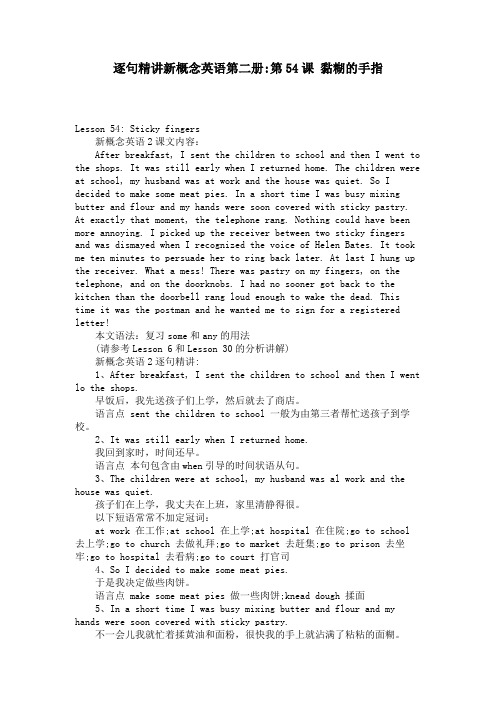
逐句精讲新概念英语第二册:第54课黏糊的手指Lesson 54: Sticky fingers新概念英语2课文内容:After breakfast, I sent the children to school and then I went to the shops. It was still early when I returned home. The children were at school, my husband was at work and the house was quiet. So I decided to make some meat pies. In a short time I was busy mixing butter and flour and my hands were soon covered with sticky pastry. At exactly that moment, the telephone rang. Nothing could have been more annoying. I picked up the receiver between two sticky fingers and was dismayed when I recognized the voice of Helen Bates. It took me ten minutes to persuade her to ring back later. At last I hung up the receiver. What a mess! There was pastry on my fingers, on the telephone, and on the doorknobs. I had no sooner got back to the kitchen than the doorbell rang loud enough to wake the dead. This time it was the postman and he wanted me to sign for a registered letter!本文语法:复习some和any的用法(请参考Lesson 6和Lesson 30的分析讲解)新概念英语2逐句精讲:1、After breakfast, I sent the children to school and then I went lo the shops.早饭后,我先送孩子们上学,然后就去了商店。
新概念英语第二册+Lesson+54+Sticky+fingers+讲义
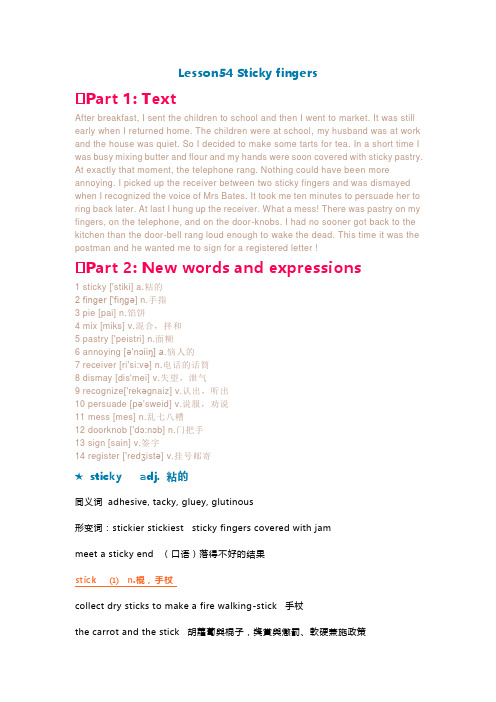
Lesson54 Sticky fingersPart 1: TextAfter breakfast, I sent the children to school and then I went to market. It was still early when I returned home. The children were at school, my husband was at work and the house was quiet. So I decided to make some tarts for tea. In a short time I was busy mixing butter and flour and my hands were soon covered with sticky pastry. At exactly that moment, the telephone rang. Nothing could have been more annoying. I picked up the receiver between two sticky fingers and was dismayed when I recognized the voice of Mrs Bates. It took me ten minutes to persuade her to ring back later. At last I hung up the receiver. What a mess! There was pastry on my fingers, on the telephone, and on the door-knobs. I had no sooner got back to the kitchen than the door-bell rang loud enough to wake the dead. This time it was the postman and he wanted me to sign for a registered letter !Part 2: New words and expressions1 sticky ['stiki] a.粘的2 finger ['fiŋgə] n.手指3 pie [pai] n.馅饼4 mix [miks] v.混合,拌和5 pastry ['peistri] n.面糊6 annoying [ə'nɔiiŋ] a.恼人的7 receiver [ri'si:və] n.电话的话筒8 dismay [dis'mei] v.失望,泄气9 recognize['rekəgnaiz] v.认出,听出10 persuade [pə'sweid] v.说服,劝说11 mess [mes] n.乱七八糟12 doorknob ['dɔ:nɔb] n.门把手13 sign [sain] v.签字14 register ['redʒistə] v.挂号邮寄★sticky adj. 粘的同义词adhesive, tacky, gluey, glutinous形变词:stickier stickiest sticky fingers covered with jammeet a sticky end (口语)落得不好的结果stick ⑴ n.棍,手杖collect dry sticks to make a fire walking-stick 手杖the carrot and the stick 胡蘿蔔與棍子,獎賞與懲罰、軟硬兼施政策cancer-stick 香烟(因吸煙易患癌症,故名)⑵vt. 插入,刺入,竖起eg:The needle stuck in my finger.⑶vi. 粘贴stick a stamp on a lettereg:The glue doesn’t stick very well . 这种胶水粘不住。
新概念英语第二册Lesson54Stickyfingers详解讲义
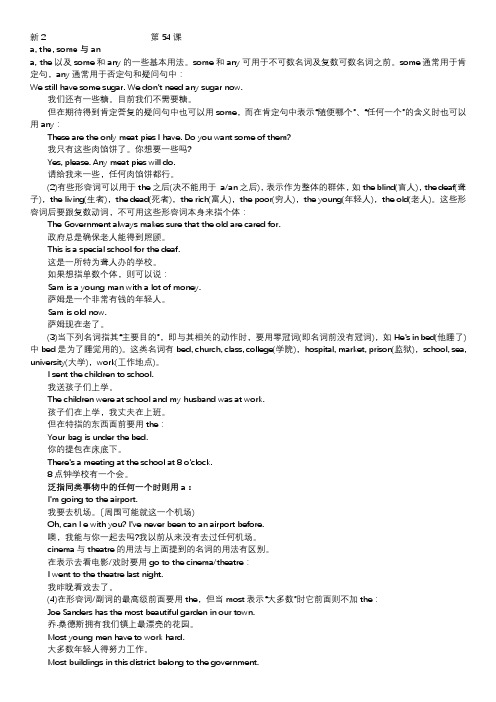
新2 第54课a, the, some与ana, the以及some和any的一些基本用法。
some和any可用于不可数名词及复数可数名词之前。
some通常用于肯定句,any通常用于否定句和疑问句中:We still have some sugar. We don't need any sugar now.我们还有一些糖。
目前我们不需要糖。
但在期待得到肯定答复的疑问句中也可以用some,而在肯定句中表示“随便哪个”、“任何一个”的含义时也可以用any:These are the only meat pies I have. Do you want some of them?我只有这些肉馅饼了。
你想要一些吗?Yes, please. Any meat pies will do.请给我来一些,任何肉馅饼都行。
(2)有些形容词可以用于the之后(决不能用于a/an之后),表示作为整体的群体,如the blind(盲人),the deaf(聋子),the living(生者),the dead(死者),the rich(富人),the poor(穷人),the young(年轻人),the old(老人)。
这些形容词后要跟复数动词,不可用这些形容词本身来指个体:The Government always makes sure that the old are cared for.政府总是确保老人能得到照顾。
This is a special school for the deaf.这是一所特为聋人办的学校。
如果想指单数个体,则可以说:Sam is a young man with a lot of money.萨姆是一个非常有钱的年轻人。
Sam is old now.萨姆现在老了。
(3)当下列名词指其“主要目的”,即与其相关的动作时,要用零冠词(即名词前没有冠词),如He's in bed(他睡了)中bed是为了睡觉用的)。
新概念英语2第54课
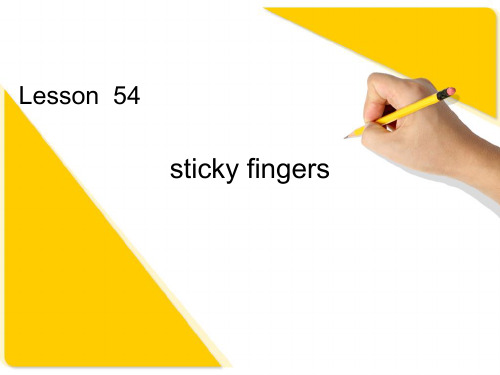
★register v. 挂号邮
★enough n.& adj.& adv. 足够 ① n. 足够 I have/had had enough. 我已经拥有足够了。 ② adj. 足够的 enough +n. / n. +enough 修饰名词 I have enough time/time enough. ③ adv. 足以…… enough 修饰 adj.或者 adv.时一定要放在被修饰词的后面 enough to do sth. 足以用来做某事 He is rich enough to buy the whole city. 他富有的可以买下整个 城市
★annoying annoyed
adj. 恼人的 adj. 感到烦恼的(比 anger 的语气弱)
★dismay
dismay sb. dismaying ★recognize
v. 失望, 泄气
让某人感到失望 adj. 令人失望; dismayed v. 认出,听出 adj. 感到失望
比较: I was busy with the housework. I was busy doing the housework.
4. At exactly that moment, the telephone rang. Nothing could have been more annoying. 恰恰在此时,电话铃响了。没有什么能比这更烦人了。 ☆exactly用于加强语气,表示“正”、“恰恰”: That's exactly what I wanted to tell you. 那正是我想要告诉你的。 5. I picked up the receiver between two sticky fingers and was dismayed when I recognized the voice of Helen Bates. 我用两个沾满面糊的手指捏起了话筒。当我听出是海伦· 贝茨的声音 时,非常丧气。
新概念英语第二册逐句精讲语言点第54课(3)

新概念英语第二册逐句精讲语言点第54课(3)Lesson 54: Sticky fingers 粘糊的手指After breakfast, I sent the children to school and then I went to the shops. It was still early when I returned home. The children were at school, my husband was at work and the house was quiet. So I decided to make some meat pies. In a short time I was busy mixing butter and flour and my hands were soon covered with sticky pastry. At exactly that moment, the telephone rang. Nothing could have been more annoying. I picked up the receiver between two sticky fingers and was dismayed when I recognized the voice of Helen Bates. It took me ten minutes to persuade her to ring back later. At last I hung up the receiver. What a mess! There was pastry on my fingers, on the telephone, and on the doorknobs. I had no sooner got back to the kitchen than the doorbell rang loud enough to wake the dead. This time it was the postman and he wanted me to sign for a registered letter!句子讲解:8、I picked up the receiver between two slicky fingers andwas dismayed when I recognized the voice of Helen Bates.我用两个沾满面糊的手指捏起了话筒。
N2 L54 新概念二 lesson54 (文库最全版本,集大成者,呕心沥血)

主语: 人
7. dismay
v. 失望, 泄气,沮丧
• • • • dismay sb. 让某人感到失望 be dismayed at sth. 对某事感到失望 dismaying adj. 令人失望 dismayed adj. 感到失望 主语:物
We were all dismayed at his refusal to cooperate. 他不肯合作使我们感到失望。
1. sticky
• 粘的 sticky rice
sticky tape
糯米
胶带
sticky fingers
有偷盗行为的人
• Don’t leave that girl alone in the room with so many valuable objects around because she has sticky fingers. • One finger cannot lift a small stone. 人多力量大/ 团结就是力量/ 众人拾柴火焰高
这是大家公认的
recognize不用于进行时
心理状态的动词 know, realize, imagine, agree, recognize, want, prefer, love, hate….一般不用于进行时 recognition n. 认出 beyond recognition 认不出来 Yangzhou has changed beyond recognition.
主语:人
使...失望
Disappoint sb Turn/let sb down disappointed-人 disappointing-物
8. recognize
① vt. 辨出,认出,认识 • We recognized the voice of Jay Chou. ② vt. 承认,确认,认可 • It is recognized that Jane is the most intelligent girl among us. • He recognized Dan as one of his best friends.
新概念英语第2册Lesson52~54课文详注

【导语】新概念英语⼀共144课。
整本书⽆论是语法还是词汇,题材还是语句,都有其出彩之处。
正是因为如此,新概念英语更是经久不衰,深受⼴⼤英语学习者的喜爱。
为您整理了“新概念英语第2册Lesson52~54课⽂详注”,希望可以帮助到您!新概念英语第2册Lesson52课⽂详注 1.I have been trying to get my new room in order.我试图把我的新房间收拾整齐。
(1)与课⽂开头那句话的后半部分⼀样,这个句⼦也⽤了现在完成进⾏时。
(cf.本课语法) (2)get…in order表in“把……整理好”,in order的含义之⼀为“整齐”、“井然有序”: Get/Put everything in order before you leave the room. 离开房间前把所有的东西都整理好。
2.To make matters worse, the room is rather small…更糟糕的是房间还⾮常⼩…… to make matters worse是个插⼊语,与主句之间要⽤逗号隔开。
matters(复数形式)可以表⽰“事态”、“情况”。
这个短语是个惯⽤语: I lost my way in the forest, and to make matters worse, it became dark. 我在森林⾥迷了路。
更糟糕的是,天开始⿊了。
3.At the moment, they cover every inch of floor space and I actually have to walk on them to get in or out of the room.这会⼉,书把地板的每⼀点空隙都占据了,我实际上是踩着这些书进出房间的。
(1)at the moment表⽰“此刻”、“⽬前”: At the moment, I'm busy preparing for the exams. ⽬前我正忙着准备考试。
新概念英语第二册lesson54

• ★recognize v 认出, 听出 • ★persuade v 说服, 劝说 • reason with sb劝说; 并不能说明是否劝说成功 • try to persuade 劝说; persuade表示劝说已经成功
第4页/共42页
• ★mess n 乱七八糟 • what a mess! • you are a mess!你真邋遢 • the man/woman is a mess • make a mess of sth把...搅得乱七八糟 • he made a mess of my job • 他把我的工作搅得一团糟
第21页/共42页
• ★mine n 矿 • ★treasure n 财宝 (为总称, 没有复数) • ‘treasure island’ 《金银岛》 • jewel n 宝石 珠宝, (可数) • jewelry n.珠宝, 珠宝类 珠宝(总称, 不可数) • I have some jewels./I have some jewelry. • people/police/cattle (总称) • diamond钻石 • jade 碧玉 (不可数名词) • jade palace:翠宫饭店
第26页/共42页
• ★soil n 泥土 • earth泥土 (泥巴) • soil土壤 (能生长植物的地方) • ★entrance n 入口 • exit n. • 出口, 太平门, 退场, 去世 vi.退出, 脱离, 去世 • entrance of/entrance to • entrance of the park / entrance to the park
第29页/共42页
【课文讲解】
• dreams come true • 梦想成真 • dreams ended • 梦想破灭了, 梦断了 • dream of • dream of doing sth
新概念英语第二册Lesson 54PPT课件
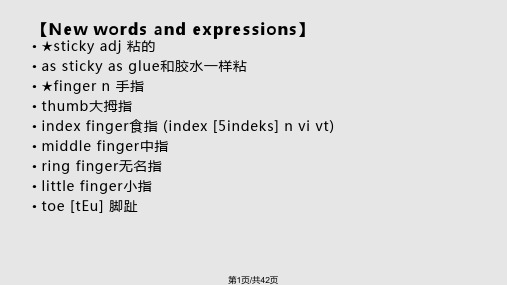
• be busy doing忙于做某事 • flour面粉, 不可数名词, 注意发音于 “flower 相同, 但 “flower” 是可数名词, 一般会用复数 “flowers” • be covered with盖满 • at exactly that monent就在那时
第9页/共42页
• no one could be/have been没有人... • no one could be /have been fatter没有人更胖了 • nothing could have been cheaper • 没有什么东西更便宜了 • no face could be uglier没有一张脸更丑了 (ugly no books
第3页/共42页
• ★recognize v 认出, 听出 • ★persuade v 说服, 劝说 • reason with sb劝说; 并不能说明是否劝说成功 • try to persuade 劝说; persuade表示劝说已经成功
第4页/共42页
• ★mess n 乱七八糟 • what a mess! • you are a mess!你真邋遢 • the man/woman is a mess • make a mess of sth把...搅得乱七八糟 • he made a mess of my job • 他把我的工作搅得一团糟
第22页/共42页
• ★revealer n 探测器 • reveal揭示 • ★invent v 发明 • invention n • ★detect v 探测 • detective n
第23页/共42页
• ★bury v 埋藏 • ★cave n 山洞 • ★seashore n 海岸 • ★pirate n 海盗 • pirate • n.海盗, 盗印者, 盗版者, 侵犯专利权者 • vt.盗印, 盗版, 掠夺, 翻印 • vi.做海盗 • ★arm v 武装 • army n 军队 • hold one's arm
新概念第二册Lesson 54笔记

Lesson 54 sticky fingers 粘糊的手指一、词汇:1、sticky:粘的stick:n.棍;手杖v.stuck-stuck 刺入:The needle stuck in my fingers.粘住:stick a stamp on a letter2、finger:n.手指thumb:大拇指index finger:食指middle finger:中指ring finger:无名指little finger:小指3、pie:馅饼4、mix:v.混合,拌和mixed-mixed-mixing mix…with…5、annoying:令人恼人的,主语通常为物annoyed:感到烦恼的,主语通常为人与这类词类似的词有:interesting和interested,exciting和excited,disappointing和disappointed。
7、recognize:v.认出;听出~ an old friend 认出一位老朋友;~your voice:听出你的声音认可,承认:Everybody recognized that he was the most hard-working student in our class.8、persuade:v说服,劝服~ sb to do sth:劝说某人做某事9、mess:n.乱七八糟What a mess!多么糟糕啊What a surprise!多么令人吃惊啊!The kitchen is a mess!可数名词10、sign:n 标记,符号指示牌 a traffic sign 一个交通指示牌v.签字Please sign here.11、register:v.登记,注册,申报~the birth of a child/~at a school注册入学挂号邮寄:a ~ed letter 挂号信n.登记簿(可数)a household ~ 户口登记簿二、课文讲解:1、send sb to school:送某人去上学go to school 去上学,中间不加the2、at exactly that moment=just at that moment=at that very moment恰恰在此时3、could have done:表示对过去的推测本可以做…本应该做…4、be dismayed at:对…感到沮丧5、no sooner…than:一…就6、enough:adv足够地,充分地(置于形容词,副词后面)warm enoughadj足够的(置于名词前面)enough time/food二、关键句型:1、some,any:表示不定数量的代词some用于肯定句;any用于否定句、疑问句2、the:1)、部分形容词前加the,表示一个群体。
新概念英语第二册Lesson_54
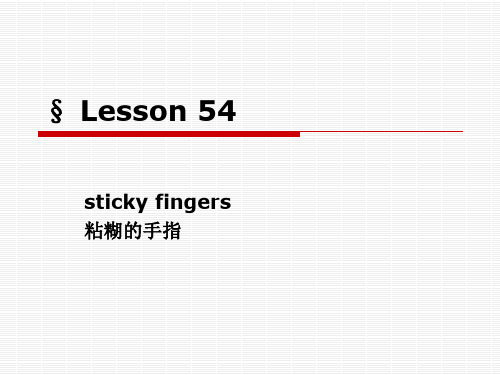
★recognize v 认出, 听出
★persuade v 说服, 劝说
reason with sb劝说; 并不能说明是否劝说 成功
try to persuade 劝说; persuade表示劝 说已经成功
★mess n 乱七八糟 what a mess! you are a mess!你真邋遢 the man/woman is a mess make a mess of sth把...搅得乱七八糟 he made a mess of my job 他把我的工作搅得一团糟
★register v 挂号邮寄
【课文讲解】
after breakfast在吃过早饭后 I send the children to school 送孩子上学 at school在上学 at work 在上班 at home在家休息
be busy doing忙于做某事
flour面粉, 不可数名词, 注意发音于 “flower 相同, 但 “flower” 是可数名词, 一般会用复数 “flowers”
be armed with with.....
went into the cave the cave.
blind瞎子 the deaf 聋子 the English英国人 Englishman,
Englishwoman
重点词 (annoyin;dismay;persuade;mess;sign)
句型
1 Nothing could have been more annoying.
2 loud enough to wake the dead.
(ugly no books could be more interesting 没有书更有趣了
新概念二Lesson 54 Sticky fingers
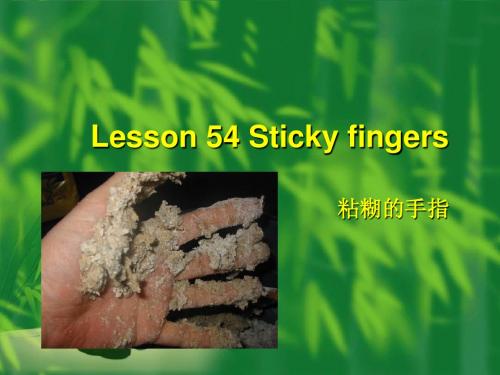
After breakfast, I sent the children to school and then I went to the shop.
After breakfast:早饭后 (时间短语) And 连接两个并列句。
Normally after breakfast ….
I made some food for Maomao, and I went to school.
May have done Could have done Should have done
I had no sooner got back to the kitchen than the doorbell rang loud enough to wake the dead.
No sooner than (过去完成时与一般过 去时的配合使用)
annoying
How annoying! 好讨 厌 He got very annoyed with me about the carelessness. 对于我的粗心,他感 到很生气。
Receiver : 听筒
Put up the receiver 接电话 Put down / hung up 放下听筒。
Lesson 54 Sticky fingers
粘糊的手指
单词与词组
Send to 送 line 1 Make some meat pies 做些肉馅饼 Be busy doing 忙于做某事 Be covered with 覆盖 At exactly that moment 恰恰在此时 Hung up 挂断 What a mess! 多乱啊! No sooner … than … 刚……就…… Wake the dead 把死人唤醒 Sigh for a registered letter 签收一封挂号信
新版 新概念英语二册讲义--54
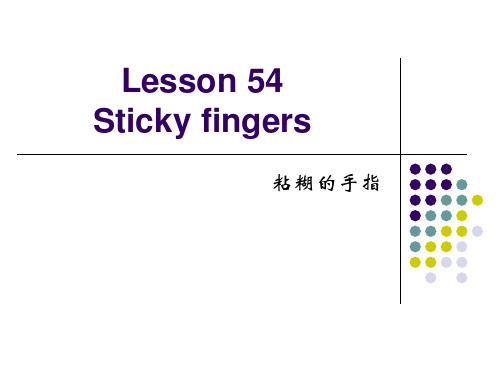
忠于某事,坚持某事
We must stick to our promise. 我们心须遵守诺言.
finger n. 手指
thumb 大拇指; 食指 index finger middle finger 中指 ring finger 无名指; little finger 小指 toe n. 脚趾
② vi. 交往,相处
Mary doesn’t mix much. 玛丽不太和人交往。 I’m not going to mix with those people. 我不打算和那些人来往。
mixture n. 混合物
annoying adj. 恼人的
It is annoying. How annoying! 真气人! He may be naughty and annoying, but he is a
Lesson 54 Sticky fingers
粘糊的手指
New words
sticky finger pie mix pastry annoying receiver
adj. 粘的 n. 手指 n. 馅饼 v. 混合,拌和 n. 面糊 adj. 恼人的 n. 电话的话筒
New words
pie n. 馅饼
apple pie strawberry pie blueberry pie pie chart
mix v. 混合, 拌和
① vt. 使混和,拌和 mix A and/with B I was busy mixing butter and flour. You can mix some salt into the flour.
dismay recognize persuade mess doorknob sign register
新概念英语第二册第54课课件
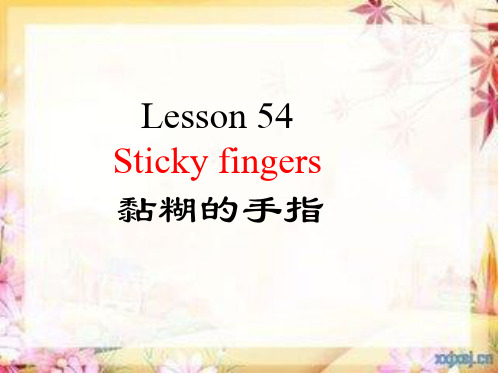
Most young men have to work hard. 大多数年轻人得努力工作。
4. At exactly that moment, the telephone rang. Nothing could have been more annoying. 恰恰在此时,电话铃响了。没有什么能比这更烦人了。 exactly用于加强语气,表示“正”、“恰恰”: That's exactly what I wanted to tell you. 那正是我想要告诉你的。 no one could have been... 没有人... no one could have been fatter没有人更胖了 nothing could have been 没有... 更... nothing could have been more exciting 没有什么事情更令人激动
★mix v 混合, 拌和
mixture n 混合物 mix up 把……混合在一起
ห้องสมุดไป่ตู้
★annoying adj 恼人的
annoyed感到烦恼的 比anger的语气弱
★dismay v 失望, 泄气
dismaying adj 令人失望 dismayed adj 感到失望 to one's diamay 使某人失望的是…… To her dismay , her name was not on the list 使她难过的是,名单上没有她的名字。 be dismayed at … 对……感到失望,震惊 I am very dismayed at the news. 我对新闻感到很震惊。
★persuade v 说服, 劝说
persuade sb (not ) to do sth 说服某人(不要)做某事 reason with sb劝说某人; 并不能说明是否劝说成功 persuade表示劝说已经成功
新概念英语第二册54课PPT课件

5
put down/ hang up the
receiver挂电话
6
receive vt. 收到;受到 c.f.
accept
7
receive a letter
8
receive a gift
9
receive education 受教育
dismay v. n.失望,泄气 disappoint
I was dismayed when I recognized the voice of Helen Bates. (TB)
04
annoy v. 使烦恼 annoyed annoyed annoying You shouldn't annoy him.
1
receiver n. 电话的话筒, 收款员,
接待者
2
speak to sb和某人讲电话
3
answer the phone接电话
4
hang on/ hold on等一下
been fired many times. • stick n.棍棒 a walking stick拐棍,手杖 • v.粘贴 stuck stuck sticking • Dust could stick to the clothing easily. • v.坚持,坚守,不放弃 • stick to one‘s position/ view/
○ pick up the receiver拿起电话 ○ pick it up拿起它
It took me ten minutes to persuade her to ring back later.
我用了10 分钟的时间才说服她过会儿再来电话。
○ It takes sb some time to do sth
新概念第二册课后题答案详解Lesson54

新概念第二册课后题答案详解Lesson541. d依据课文第6-12行,只有d. at an inconvenient time (在不便利的时候)与课文的实际内容相符,其他3个选择都与课文的事实不符。
2. b依据课文第6-12行,可以推断只有b. the writer was interrupted several times while making meat pies (当做肉馅时几次被打断)才是Everything got into a mass (一切都被搞乱了)的真正缘由,其他3个选择都与故事中的情节不符。
3. d只有 d. 是对的。
该句的意思是“早餐是一天中的第一顿饭”这里的breakfast 是泛指的早餐。
而不是详细指某一顿早餐,因此前面不要加冠词。
所以a. the, b. A, c. This 都不对。
4. b只有b. at 可以同本句中的home 连用构成固定短语,at home 表示在家,而其他3个介词都不能同home 连用,所以选b.5. d本句只有用级才能同前一句Nothing could have been more annoying (再没有比这更烦人的了) 的含义一样。
a. the more 不是级;b. more 只能用于比拟级;c. most 前面缺少定冠词,不能表示级;只有d. the most 是级形式,最符合题目意思,所以选d.6. bHelen Bates (海伦·贝茨)是一个女人的名字,由于是以字母s结尾的,它的全部格形式就应当是在名字后面加一小撇’而无需再用-’s. 只有b. Bates’是正确的全部格形式,其他3个都不对。
所以选b.7. a只有a. when 可以同这一句中的hardly 连用,表示“刚刚……就”,所以选a. 其他3个选择都不能同when 搭配。
8. da. joining them(连接它们,参加他们的行列);b. uniting them(联合统一他们)c. unifying them(统一他们)d. putting them together(把它们放到一起).只有d.能够解释说明前一句中的mixing butter and flour(调拌黄油和面粉),其他3个选择意思都不够贴切,所以选d.9. ca. ink (墨水);b. water (水);c. glue (胶水);d. flour (面粉)这4个词中只有c. glue 同这一句中的pastry (面糊)性质相像,它们都是粘的,所以选c.10. ba. pity (圆满的事,惋惜的事),b. sorry (难受的,惋惜的);c. ill (有病的);d. tired (疲惫的,累的)这4个词中只有b. sorry 同前一句中的dismayed (绝望的,灰心的)含义最接近,所以选b.11. d前一句She hung up the receiver 意思为“她挂上了话筒”,本句需要选出同前一句意思一样的短语。
- 1、下载文档前请自行甄别文档内容的完整性,平台不提供额外的编辑、内容补充、找答案等附加服务。
- 2、"仅部分预览"的文档,不可在线预览部分如存在完整性等问题,可反馈申请退款(可完整预览的文档不适用该条件!)。
- 3、如文档侵犯您的权益,请联系客服反馈,我们会尽快为您处理(人工客服工作时间:9:00-18:30)。
新概念英语第二册:第54课课文详解及语法解析
课文详注 Further notes on the text
1.The children were at school, my husband was at work…孩子们在上学,我丈夫在上班……
school和work前都没加冠词,因为不是指具体那个学校或具体干什么工作,只是泛指他们在干什么。
2.at exactly that moment, 恰恰在此时。
exactly用于加强语气,表示“正”、“恰恰”:
That's exactly what I wanted to tell you.
那正是我想要告诉你的。
3.Nothing could have been more annoying.没有什么能比这更烦人了。
用这个句型可以表达许多感情,换一下最后的形容词即可:
Nothing could have been more exciting/ interesting/ embarrassing.
没有什么能比这更激动人心/有趣/令人尴尬的了。
4.It took me ten minutes to persuade her to ring back later. 我用了10分钟的时间才说服她过会儿再来电话。
(1)it为先行主语,代指to persuade引导的不定式短语。
(2)表示说服某人做某事时,可以用persuade+sb.+to do sth.这个结构:
I persuaded him to give up that plan.
我劝他放弃那项计划。
也可以用persuade+sb. +into doing sth. 这个结构:
I persuaded him into giving up that plan.
(译文同上)
(3)later可以表示“过后”、“以后”:
Ten minutes later, the bus arrived.
10分钟以后,公共汽车来了。
Please come back later(on).
请过会儿再来。
5.What a mess! 真是糟糕透了!
在口语中,a mess可以用来指“困境”、“窘境”、“一团糟”等含义:
I made a mess of my exam.
我考试考得一团糟。
Make some jam if you want to, but don't make a mess in the kitchen.
你如果愿意就做些果酱,不过别把厨房弄得一团糟。
6.I had no sooner got back to the kitchen than the doorbell rang loud enough to wake the dead.我刚回到厨房,门铃又响了起来,响声足以把死人唤醒。
(1)连词no sooner…than…(刚……就……)用于过去完成时。
(cf.第38课语法)
(2)enough作副词用在形容词或副词之后,有“足以……”的含义:
The water in the pool is warm enough (to swim in).
池里的水够暖和的(,可以游泳)。
语法 Grammar in use
a,the, some与any(cf.第6课与第30课语法)
(1)在第6课与第30课的语法中,我们学习了冠词a, the以及some和any的一些基本用法。
some和any可用于不可数名词及复数可数名词之前。
some通常用于肯定句,any 通常用于否定句和疑问句中:
We still have some sugar. We don't need any sugar now.
我们还有一些糖。
目前我们不需要糖。
但在期待得到肯定答复的疑问句中也可以用some,而在肯定句中表示“随便哪个”、“任何一个”的含义时也可以用any:
These are the only meat pies I have .Do you want some of them?
我只有这些肉馅饼了。
你想要一些吗?
Yes,please.Any meat pies will do.
请给我来一些,任何肉馅饼都行。
(2)有些形容词可以用于the之后(决不能用于 a/an之后),表示作为整体的群体,如
the blind(盲人),the deaf(聋子),the
living(生者),the dead(死者),the rich(富人),the poor(穷人),the young(年轻人),the
old(老人)。
这些形容词后要跟复数动词,不可用这些形容词本身来指个体:The Government always makes sure that the old are cared for.
政府总是确保老人能得到照顾。
This is a special school for the deaf.
这是一所特为聋人办的学校。
如果想指单数个体,则可以说:
Sam is a young man with a lot of money.
萨姆是一个非常有钱的年轻人。
Sam is old now.
萨姆现在老了。
(3)当下列名词指其“主要目的”,即与其相关的动作时,要用零冠词(即名词前没有冠词),如He's in bed(他睡了)中bed是为了睡觉用的)。
这类名词有bed, church, class,
college(学院),hospital, market, prison(监狱),school, sea, university(大学),work(工作地点)。
I sent the children to school.
我送孩子们上学。
The children were at school and my husband was at work.
孩子们在上学,我丈夫在上班。
但在特指的东西面前要用the:
Your bag is under the bed.
你的提包在床底下。
There's a meeting at the school at 8 o'clock.
8点钟学校有一个会。
泛指同类事物中的任何一个时则用a:
I'm going to the airport.
我要去机场。
〔周围可能就这一个机场)
Oh,can I come with you?I've never been to an airport before.
噢,我能与你一起去吗?我以前从来没有去过任何机场。
cinema与theatre的用法与上面提到的名词的用法有区别。
在表示去看电影/戏时要用go to the cinema/theatre:
I went to the theatre last night.
我昨晚看戏去了。
(4)在形容词/副词的级前面要用the,但当most表示“大多数”时它前面则不加the:Joe Sanders has the most beautiful garden in our town.
乔·桑德斯拥有我们镇上最漂亮的花园。
Most young men have to work hard.
大多数年轻人得努力工作。
Most buildings in this district belong to the government. 这个地区的大部分建筑属于政府所有。
